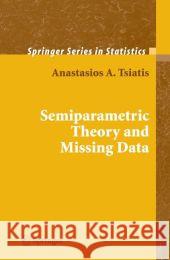Semiparametric Theory and Missing Data » książka
Semiparametric Theory and Missing Data
ISBN-13: 9781441921857 / Angielski / Miękka / 2010 / 388 str.
Missing data arise in almost all scientific disciplines. In many cases, the treatment of missing data in an analysis is carried out in a casual and ad-hoc manner, leading, in many cases, to invalid inference and erroneous conclusions. In the past 20 years or so, there has been a serious attempt to understand the underlying issues and difficulties that come about from missing data and their impact on subsequent analysis. There has been a great deal written on the theory developed for analyzing missing data for finite-dimensional parametric models. This includes an extensive literature on likelihood-based methods and multiple imputation. More recently, there has been increasing interest in semiparametric models which, roughly speaking, are models that include both a parametric and nonparametric component. Such models are popular because estimators in such models are more robust than in traditional parametric models. The theory of missing data applied to semiparametric models is scattered throughout the literature with no thorough comprehensive treatment of the subject. This book combines much of what is known in regard to the theory of estimation for semiparametric models with missing data in an organized and comprehensive manner. It starts with the study of semiparametric methods when there are no missing data. The description of the theory of estimation for semiparametric models is at a level that is both rigorous and intuitive, relying on geometric ideas to reinforce the intuition and understanding of the theory. These methods are then applied to problems with missing, censored, and coarsened data with the goal of deriving estimators that are as robust and efficient as possible.











